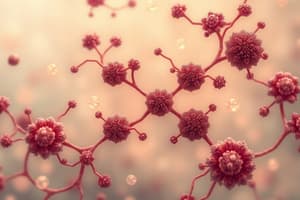Podcast
Questions and Answers
What is the chemical name of Ibuprofen?
What is the chemical name of Ibuprofen?
- Acetaminophen
- Isobutylphenylproprionic acid (correct)
- Ampicillin
- Aminobenzyl Penicillin
Which of the following represents a therapeutic class of drugs?
Which of the following represents a therapeutic class of drugs?
- Antihypertensives (correct)
- Ibuprofen
- Beta-adrenergic blockers
- Paracetamol
Which option represents a correctly formatted route of drug administration for sublingual use?
Which option represents a correctly formatted route of drug administration for sublingual use?
- IM
- BUCC
- SL (correct)
- PO
Which of the following is NOT one of the 'Five Rights' of medication administration?
Which of the following is NOT one of the 'Five Rights' of medication administration?
What is a distinguishing feature of controlled substances?
What is a distinguishing feature of controlled substances?
Which abbreviation indicates a drug administered via intramuscular route?
Which abbreviation indicates a drug administered via intramuscular route?
What is the purpose of using a drug’s generic name?
What is the purpose of using a drug’s generic name?
Which statement about the prescription format is incorrect?
Which statement about the prescription format is incorrect?
What is the main focus of pharmacodynamics?
What is the main focus of pharmacodynamics?
Which term describes the study of absorption, distribution, metabolism, and excretion of drugs?
Which term describes the study of absorption, distribution, metabolism, and excretion of drugs?
What role does the FDA play in pharmacology?
What role does the FDA play in pharmacology?
Which of the following statements about adverse drug reactions is true?
Which of the following statements about adverse drug reactions is true?
What does the term 'half-life' in pharmacokinetics refer to?
What does the term 'half-life' in pharmacokinetics refer to?
Which branch of pharmacology focuses specifically on undesirable effects of drugs?
Which branch of pharmacology focuses specifically on undesirable effects of drugs?
Pharmacotherapeutics primarily deals with which aspect of drug use?
Pharmacotherapeutics primarily deals with which aspect of drug use?
What is the primary focus of clinical pharmacology?
What is the primary focus of clinical pharmacology?
What is a potential disadvantage of the oral route of drug administration?
What is a potential disadvantage of the oral route of drug administration?
What effect does the first-pass metabolism have on drugs administered orally?
What effect does the first-pass metabolism have on drugs administered orally?
Which of the following is NOT a major route of drug administration?
Which of the following is NOT a major route of drug administration?
Why might oral drug administration be ineffective in some cases?
Why might oral drug administration be ineffective in some cases?
Which scenario would most likely prevent the use of oral medication?
Which scenario would most likely prevent the use of oral medication?
What is the primary purpose of enteric-coated preparations?
What is the primary purpose of enteric-coated preparations?
Which factor can influence the absorption of orally administered drugs?
Which factor can influence the absorption of orally administered drugs?
In which situation is the intravenous (IV) route preferred over oral administration?
In which situation is the intravenous (IV) route preferred over oral administration?
What is a primary advantage of extended-release preparations?
What is a primary advantage of extended-release preparations?
What is a disadvantage of the sublingual and buccal routes of administration?
What is a disadvantage of the sublingual and buccal routes of administration?
Which of the following is NOT a use for the parenteral route of drug administration?
Which of the following is NOT a use for the parenteral route of drug administration?
What is a key benefit of intravenous (IV) drug administration?
What is a key benefit of intravenous (IV) drug administration?
A major disadvantage of intravenous drug administration is:
A major disadvantage of intravenous drug administration is:
Which route of administration bypasses the first-pass metabolism?
Which route of administration bypasses the first-pass metabolism?
What is a common reason for using the intramuscular (IM) route?
What is a common reason for using the intramuscular (IM) route?
Which of the following statements about the disadvantages of parenteral drug administration is true?
Which of the following statements about the disadvantages of parenteral drug administration is true?
What is the primary function of depot preparations in drug administration?
What is the primary function of depot preparations in drug administration?
Which of the following is an advantage of subcutaneous (SC) injections?
Which of the following is an advantage of subcutaneous (SC) injections?
What is a common use for the intradermal (ID) route of drug administration?
What is a common use for the intradermal (ID) route of drug administration?
Why is nasal inhalation an effective route for delivering certain drugs?
Why is nasal inhalation an effective route for delivering certain drugs?
In which scenario is the intrathecal injection method preferred?
In which scenario is the intrathecal injection method preferred?
What is a major limitation of using the transdermal route for drug administration?
What is a major limitation of using the transdermal route for drug administration?
Which route should NOT be used for drugs that cause tissue irritation?
Which route should NOT be used for drugs that cause tissue irritation?
What is one characteristic of drugs administered via oral inhalation?
What is one characteristic of drugs administered via oral inhalation?
Flashcards are hidden until you start studying
Study Notes
Pharmacology Basics: Introduction
- Pharmacology is the study of drug effects on living systems. It covers aspects like drug source, properties, administration, absorption, action, metabolism, excretion, uses, and adverse effects.
- A drug is any substance used to modify physiological systems or treat disease.
- Pharmacodynamics focuses on drug effects on the body (what the drug does).
- Pharmacokinetics focuses on how the body handles drugs (absorption, distribution, metabolism, excretion).
Pharmacokinetic Processes
- Absorption: The process by which a drug enters the bloodstream from the site of administration.
- Distribution: The process by which a drug travels from the bloodstream to various tissues and organs.
- Metabolism: The process by which a drug is chemically transformed into a form that can be excreted.
- Excretion: The process by which a drug is eliminated from the body, primarily through urine, feces, and breath.
Basic Pharmacokinetic Terms
- Half-life: The time it takes for the concentration of a drug in the plasma to reduce by half.
- Steady state: When the rate of drug administration equals the rate of drug elimination, resulting in a constant concentration of the drug in the body.
- Order of kinetics: Describes the relationship between the rate of drug elimination and the drug concentration.
Drug Safety and Effectiveness
- Factors affecting drug action: Age, weight, sex, disease state, genetics, and other medications.
- Adverse drug reactions (ADRs): Unintended effects of a drug. These can range from mild and transient to severe and even fatal.
- Drug names:
- Chemical name: Describes the drug’s chemical composition and molecular structure.
- Generic name (nonproprietary name): The official name assigned by the United States Adopted Name Council.
- Trade name/Brand name/Product (proprietary name): The name given to a drug by the manufacturer, protected by trademark.
Drug Grouping:
- Pharmacologic class: Groups drugs that share similar characteristics, like beta-adrenergic blockers.
- Therapeutic class: Groups drugs by their therapeutic use, like antihypertensives.
Routes of Drug Administration
- Enteral routes: Drugs are administered through the gastrointestinal tract (oral, sublingual, buccal).
- Parenteral routes: Drugs are administered directly into the bloodstream or tissues bypassing the GI tract (IV, IM, SC, ID).
- Other routes: Transdermal, nasal inhalation, oral inhalation, topical, rectal, vaginal.
Oral Route
- Advantages: Convenience, self-administration, relatively safe, cost-effective.
- Disadvantages: Variable absorption, possible inactivation by gastric acid or digestive enzymes, first-pass effect, delayed action.
Parenteral Routes
- Advantages: Bypass first-pass metabolism, accurate dosing, rapid onset of action.
- Disadvantages: Irreversible, potential for infection, risk of tissue damage, pain, fear.
Special Considerations
- First-pass effect: Metabolic inactivation of a drug by the liver before it reaches systemic circulation.
- Depot preparations: Drugs formulated to provide sustained release of medication over a longer period of time.
- Controlled Substances: Drugs with a high potential for abuse and tightly regulated use and distribution.
Studying That Suits You
Use AI to generate personalized quizzes and flashcards to suit your learning preferences.




